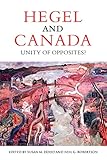Hegel and Canada : Unity of Opposites? / ed. by Susan Dodd, Neil G. Robertson.
Material type: TextPublisher: Toronto : University of Toronto Press, [2018]Copyright date: ©2018Description: 1 online resource (408 p.)Content type:
TextPublisher: Toronto : University of Toronto Press, [2018]Copyright date: ©2018Description: 1 online resource (408 p.)Content type: - 9781442644472
- 9781442660663
- 191 23
- B981 .H44 2018eb
- online - DeGruyter
| Item type | Current library | Call number | URL | Status | Notes | Barcode | |
|---|---|---|---|---|---|---|---|
 eBook
eBook
|
Biblioteca "Angelicum" Pont. Univ. S.Tommaso d'Aquino Nuvola online | online - DeGruyter (Browse shelf(Opens below)) | Online access | Not for loan (Accesso limitato) | Accesso per gli utenti autorizzati / Access for authorized users | (dgr)9781442660663 |
restricted access online access with authorization star
http://purl.org/coar/access_right/c_16ec
Hegel has had a remarkable, yet largely unremarked, role in Canada's intellectual development. In the last half of the twentieth-century, as Canada was coming to define itself in the wake of World War Two, some of Canada's most thoughtful scholars turned to the work of G.W.F. Hegel for insight. Hegel and Canada is a collection of essays that analyses the real, but under-recognized, role Hegel has played in the intellectual and political development of Canada. The volume focuses on the generation of Canadian scholars who emerged after World War Two: James Doull, Emil Fackenheim, George Grant, Henry S. Harris, and Charles Taylor. These thinkers offer a uniquely Canadian view of Hegel's writings, and, correspondingly, of possible relations between situated community and rational law. Hegel provided a unique intellectual resource for thinking through the complex and opposing aspects that characterize Canada. The volume brings together key scholars from each of these five schools of Canadian Hegel studies and provides a richly nuanced account of the intellectually significant connection of Hegel and Canada.
Mode of access: Internet via World Wide Web.
In English.
Description based on online resource; title from PDF title page (publisher's Web site, viewed 01. Nov 2023)


